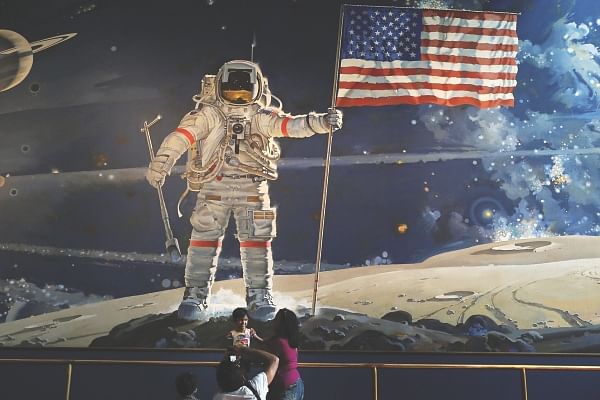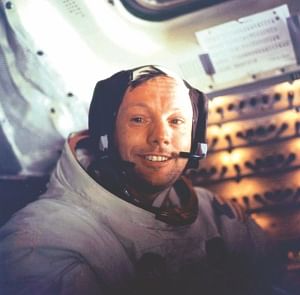| Home - Back Issues - The Team - Contact Us |
 |
| Volume 11 |Issue 35| September 07, 2012 | |
|
|
Musings
Neil Armstrong . . . Syed Badrul Ahsan
Neil Armstrong's is a name that has always had a special resonance in all our lives. There were all the qualities of humility and patience in him. Not for him the hauteur of feeling important and letting people know of the larger than life figure he had become after that walk on the moon. Not for him that coveted life in the limelight, to be celebrated as a more than ordinary mortal because his was the first human footmark on the moon. Armstrong died as he lived. He was called to duty. He carried out that duty well and then went into the background. There are few men or women you will come across in life or in history who can even remotely approximate Neil Armstrong in strength of personality and profundity of thought. And yet we do not forget the icon he became for all of us when his early words were beamed to us here on earth all the way from the Sea of Tranquillity on the moon. "The Eagle has landed", he informed the world as the lunar module carrying him touched soil never before experienced by man. A little while later came what would turn into an immortal statement, "That's one small step for man, one giant leap for mankind." It is immaterial today whether the quirks of technology tampered with the article 'a' Armstrong said he had used in his statement. What matters now is the memory of that defining moment. Now that Armstrong is dead, it strikes you as rather intriguing that he was buried on a day when a blue moon sailed across the sky. In a very poetic sense of the meaning, that blue moon was a necessary celebration of the life and times of the first man on the moon. In larger measure, the blue moon and Armstrong's burial were for those of us who went through our riotous teens in the chaotic 1960s a reminder of the sense of adventure the Apollo 11 astronauts exemplified for every man and woman on earth. Right from the moment the spacecraft lifted off from Cape Kennedy and till the moment Neil Armstrong and then Edwin Aldrin began to take their walk, rabbit-like, on the surface of the moon before homing back to earth, we stayed glued to the special radio programme on the lunar landing on the Voice of America. Back where we lived in 1969, television was yet a happening of the future. In hindsight, for many of us this absence of television was a blessing, for nothing can be more educative than learning of life and its attendant prospects and dangers through listening to the radio. The auditory is what keeps your memory going; the visual is a stumbling block to the powers of your imagination.
And so it was that Armstrong's voice crackled across the distance on that July day in 1969, to remind us, in Tennyson's words, that we could do much "to strive, to seek, to find and not to yield". Here was the moon, for centuries a centerpiece of human emotions in terms of a formulation of poetry and an expression of the sublimity of love, now territory we had conquered. Which reminds you again, this time of Robert Browning, 'Ah, but a man's reach should exceed his grasp / Or what's a heaven for?' In the 1960s, the Cold War was being fought relentlessly; Vietnam was being napalmed and the world was caught between Mao's little red book and America's struggle against communism. Charles de Gaulle, having survived the mass revolt of May 1968, would step down in April 1969. Czechoslovakia, after a brief flirtation with Prague Spring, was back in the grip of Stalinist regimentation. Richard Nixon, campaigning on the theme of 'Bring Us Together', narrowly beat Hubert Humphrey in the race for the presidency of the United States in a year that saw assassins take the lives of Martin Luther King Jr. and Robert F. Kennedy. The moon landing was a point of relief, a moment of catharsis for all of us across the globe. As Armstrong and Aldrin flip-flopped on the lunar surface and Michael Collins kept watch above in the command module, many in America and elsewhere recalled President John F. Kennedy's promise in 1961 to have a man land on the moon within the decade and have him return safely to earth. Beautiful irony was there when President Richard M. Nixon, JFK's defeated rival for the White House in 1960, welcomed the Apollo 11 astronauts back to earth. There are flashes of light which often convey brilliance to history as it moves on. Neil Armstrong's walk on the moon was that light — certain, eloquent and pregnant with meaning — back in July 1969. Having flown past the stars on a summer's day, he now goes to meet his Maker. (Neil Armstrong, commander of Apollo 11 and first man on the moon, was born on 5 August 1930. He died on 25 August 2012) The writer is Executive Editor, The Daily Star.
|
||||||||
Copyright
(R) thedailystar.net 2012 |


